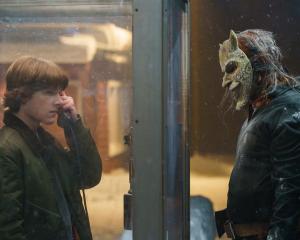
Too often reduced to exploitation, gore, jump scares and cheap thrills, horror has long carried a bad rap: the genre that’s somehow "less than" and "for a certain demographic". But for Alexandre O. Philippe — the director behind documentaries about Psycho, the Alien films, and the influence of The Wizard of Oz on film-maker David Lynch — horror is anything but disposable. It’s essential.
This belief lies at the heart of Philippe’s filmography, which approaches horror with the seriousness it deserves.
His documentary on Psycho, called 78/52, examines the film’s infamous shower scene, for which Hitchcock employed 78 camera set-ups and 52 cuts.
The latest addition to Philippe’s compendium of work is Chain Reactions, which explores the seismic cultural ripple effects of Tobe Hooper’s 1974 film The Texas Chain Saw Massacre. Both screened as part of Whānau Mārama New Zealand International Film Festival this month.
"I grew up watching a lot of horror films," Philippe says.
"The Texas Chain Saw Massacre felt a little too real, too uncomfortable, too dangerous. That one took me years to face."
When Philippe finally sat down to watch Tobe Hooper’s 1974 landmark film, it was on a sunny afternoon in New Haven. He was in his early 20s, dating someone at Yale, commuting from NYU on the weekends. "I remember it very distinctly — it was a beautiful day. The birds were singing, and the sun was shining. I rented it thinking, ‘let’s just get it over with’." What followed was an experience so visceral and unnerving, he had to physically remove himself from the screen.

"I remember Sally just screaming, screaming, screaming. It felt like well over an hour. It’s not that long, but it was insufferable."
For Philippe, this is exactly the point. Horror isn’t meant to be comfortable — it unsettles what we perceive as safe.
"Horror maps the human psyche," he continues. "It shows us what we’re afraid of, what we’re struggling with. We’re afraid to face our fears, and therefore, we’re afraid to face who we are. That’s why we malign horror. It’s too uncomfortable."
He argues that horror is more than entertainment — it’s a pulse check on society, picking up cultural anxieties simmering under the surface and making them horrible.
"You can track the history of horror with certain monsters, and why they come back at certain times."
Take Weapons, Zach Cregger’s follow-up to Barbarian. "It’s not about Trump, but it’s about Trump," Philippe says. "It’s the first great generational horror film of the Trump era. That’s the zeitgeist working through Zach to express certain ideas. I don’t think it’s conscious on his part."
If society avoids horror because it’s afraid of what it might find, Philippe suggests individuals do the same.
"Horror is about expressing, understanding, and facing our own fears. Stephen King says this in Chain Reactions. Once you understand what you’re afraid of, you’re much closer to understanding yourself."
That’s not an easy path. Horror doesn’t let us hide behind what’s comfortable. It digs deep.
"We like safety. That’s why we go to Starbucks instead of crossing the street for a real coffee from an independent brewer. We like to watch Jurassic Park 7 or 8 or 15, because it’s going to keep nudging you to say, ‘Hey, remember this? Remember that scene? Remember that moment?’ because it feels safe.
"Horror can reveal stuff about us that we don’t like. That’s why it’s one of the most important genres."
But turning our attention back to the Texas road trip that turned bloody, even within the horror world The Texas Chain Saw Massacre’s director remains sidelined from auteur discussions.
"My blunt assessment: The Texas Chain Saw Massacre is a masterpiece. One of the greatest films of all time," Philippe says. "But Hooper’s filmography is uneven. He never quite reached that level again."

Even if there’s a lingering underestimation of Hooper’s body of work, you can’t deny The Texas Chain Saw Massacre’s singular brilliance.
"Watching it with audiences, some of whom are seeing it for the first time, the film hasn’t lost any of its power."
Part of horror’s image problem, Philippe says, isn’t about the films. It’s about the system.
"The problem is the distribution machine. I’ve heard buyers say, ‘This film made us cry, we loved it. But it’s not commercial enough’. So, they don’t release it."
"Like everything, there are some s*** horror films, but there are also s*** romantic comedies and s*** westerns."
And yet, Philippe remains hopeful. Texas Chain Saw’s re-release — alongside his eight-transfer box set — is a testament to the film’s enduring power. "We’ve got a 35mm grindhouse print, two 16mm versions, a Super Eight abridged version, and several international VHS tapes," he says, gleefully.
"I’m a cinephile first, film-maker second," Philippe says. "I think that’s true of every real film-maker. You do this because you love movies, not because you want to make a buck."
It’s a calling that never ends.
"My whole life, I’m going to be a student of cinema. There’s so much to learn — it’s endless. The more you learn, the more you realise you don’t know anything."
Philippe’s earliest horror obsessions — Scanners, Eyes Without a Face, Night of the Living Dead, Alien — haunted him from the VHS shelf as a kid with no parental restrictions.
"Another film I waited a long time to watch was Evil Dead. The images terrified me. It has the energy of Texas Chain Saw, not the intensity of the horror. Strangely, these are the only two films that I waited a long time to watch."
As Chain Reactions prepares to roll out globally, The Texas Chain Saw Massacre sliced back into 1000 American theatres 51 years after its initial opening — a testament to the staying power of great horror.











